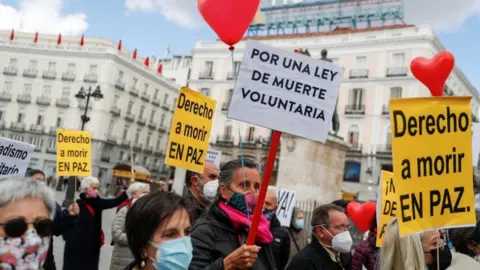Spain passes law allowing euthanasia
 Reuters
ReutersSpain has passed a law to legalise euthanasia, becoming the fourth country in Europe to allow people to end their own life in some circumstances.
Spain's lower house of parliament approved the law with support from centre and left-wing parties on Thursday.
The law allows adults with "serious and incurable" diseases that cause "unbearable suffering" to choose to end their lives.
It is expected to take effect in June.
Before the law's passage, helping somebody to die in Spain was potentially punishable by a jail term of up to 10 years.
"Today we have become a country that is more humane, fairer and freer," Spanish Prime Minister Pedro Sánchez tweeted just minutes after the vote. "The euthanasia law, widely demanded by society, has finally become a reality."
The passage of the law was celebrated by right-to-die campaigners, but condemned by conservative and religious groups.
Belgium, Luxembourg, the Netherlands, Canada and Colombia are the only other countries in which euthanasia is currently legal.
Portugal's parliament had attempted to take the same step. But this week, legislation that sought to legalise euthanasia was rejected as unconstitutional by the country's top court.
What happened in parliament?
Lawmakers from the Spanish parliament's lower house passed the law, with 202 votes in favour, 141 against and two abstentions.
Spain's minority coalition government, which is led by Mr Sanchez's Socialist Party, had to seek the support of other parties to pass the bill.
"Today is an important day: we are heading towards the recognition of human rights. We are heading towards a more humane and fair society," Health Minister Carolina Darias told lawmakers.
 EPA
EPAOutside parliament, groups for and against the bill demonstrated during the debate and the vote.
Danel Aser Lorente, a 45-year-old film lecturer whose mother had Alzheimer's and was denied the right to end her own life, was pleased with the outcome.
"From today, we Spaniards will be able to sleep easier, feeling a bit more free," he told the AFP news agency.
 EPA
EPABut the law faces staunch opposition from far-right and religious groups that believe euthanasia is wrong.
The far-right Vox party has said it will challenge the law in Spain's Constitutional Court.
What does the law allow?
The Spanish law permits two voluntary means of allowing a person to end their own life: euthanasia and assisted suicide.
Euthanasia is the act of intentionally ending a life to relieve suffering - for example a lethal injection administered by a doctor. In cases of assisted suicide, the act is undertaken by the person themselves with help.
To request either, the person must:
- suffer a "serious or incurable illness" or a "chronic or incapacitating" condition that causes "intolerable suffering"
- be an adult Spanish national or a legal resident
- be "fully aware and conscious" when they make the request, which has to be submitted twice in writing, 15 days apart
A doctor can reject the request if the requirements have not been met. It must be approved by a second medic and by an evaluation body.
Any medic can withdraw on grounds of "conscience" from taking part in the procedure.
